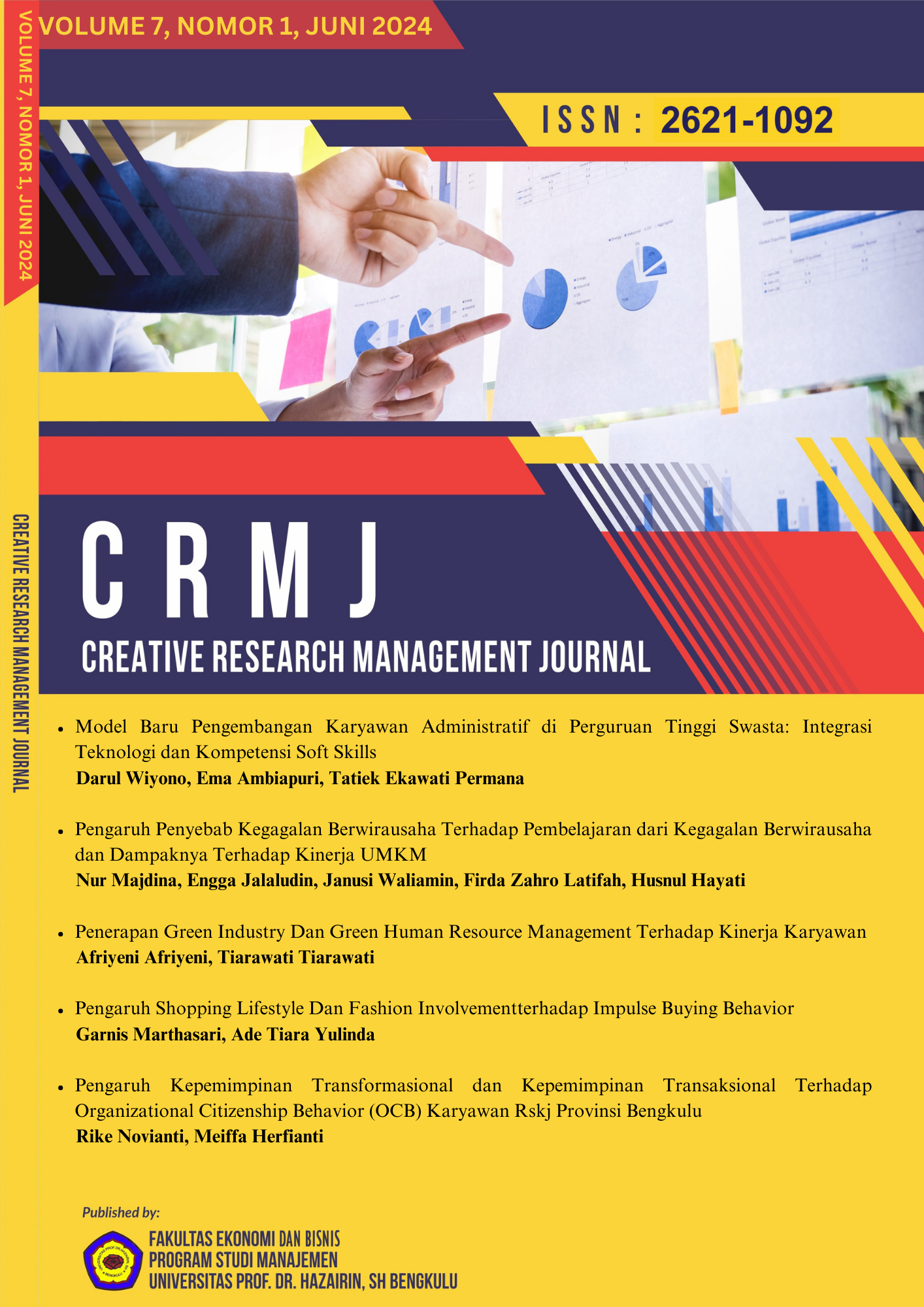PENGARUH PENYEBAB KEGAGALAN BERWIRAUSAHA TERHADAP PEMBELAJARAN DARI KEGAGALAN BERWIRAUSAHA DAN DAMPAKNYA TERHADAP KINERJA UMKM
DOI:
https://doi.org/10.32663/mtrk0p36Kata Kunci:
Causes of Entrepreneurial Failure, Learning from Entrepreneurial Failure, Business Performance, SMESAbstrak
The main objective of this research is to examine the influence of the causes of entrepreneurial failure by using two types of causes of entrepreneurial failure (internal causes and external causes) on learning from entrepreneurial failure and its impact on the performance of SMEs in DKI Jakarta. The research method used in this research is a quantitative research method using a survey with the analytical tool used, namely Smart PLS version 3.0. which aims to examine the variables that cause internal failure, the causes of external failure, learning from entrepreneurial failure and its impact on business performance variables. The research results show that the variable learning from failure has a significant positive effect on business performance. Likewise, the variables that cause entrepreneurial failure from internal factors have a positive and significant effect on learning from entrepreneurial failure. However, in contrast to the results of testing variables that cause failure from external factors on learning from entrepreneurial failure, it shows that there is no influence on the causes of entrepreneurial failure from external factors on learning from entrepreneurial failure. It is hoped that this research can provide suggestions and input, especially for SMEs, so that they can turn entrepreneurial failures into lessons to improve business performance. This research also has several limitations, including that the SME business sector in this research is still too general, and this research only uses subjective performance measures.
Referensi
Adom, E., & Affum-osei, E. (2019). Entrepreneurship as a career choice : The impact of locus of control on aspiring entrepreneurs ’ opportunity recognition. Journal of Business Research, 98(October 2018), 227–235. https://doi.org/10.1016/j.jbusres.2019.02.006
Baumard, P., & Starbuck, W. H. (2005). Learning from failures: Why it may not happen. Long Range Planning, 38(3 SPEC. ISS.), 281–298. https://doi.org/10.1016/j.lrp.2005.03.004
Bierwerth, M., Schwens, C., Isidor, R., & Kabst, R. (2015). Corporate entrepreneurship and performance: A meta-analysis. Small Business Economics, 45(2), 255–278. https://doi.org/10.1007/s11187-015-9629-1
Boso, N., Adeleye, I., Donbesuur, F., & Gyensare, M. (2019). Do entrepreneurs always benefit from business failure experience? Journal of Business Research, 98, 370–379. https://doi.org/10.1016/j.jbusres.2018.01.063
Cope, J. (2011). Entrepreneurial learning from failure: An interpretative phenomenological analysis. Journal of Business Venturing, 26, 604–623. https://doi.org/10.1016/J.JBUSVENT.2010.06.002
Delly Nofiani, Nurul IndartiAndy Susilo Lukito-Budi, H. F. G. G. M. (2021). The dynamics between balanced and combined ambidextrous strategies: a paradoxical affair about the effect of entrepreneurial orientation on SMEs’ performance. Https://Www.Emerald.Com/Insight/Publication/Issn/2053-4604.
Funken, R., Gielnik, M. M., & Foo, M. Der. (2020). How Can Problems Be Turned Into Something Good? The Role of Entrepreneurial Learning and Error Mastery Orientation. Entrepreneurship: Theory and Practice, 44(2), 315–338. https://doi.org/10.1177/1042258718801600
Hisnul. (2022). Jurnal Ekonomi dan Bisnis , Vol . 11 No . 1 Juli 2022 E - ISSN, 11(1).
Indarti, N. (2010). University of Groningen The effect of knowledge stickiness and interaction on absorptive capacity Indarti, N., 5–6.
Khanna, R., Guler, I., & Nerkar, A. (2016). Fail often, fail big, and fail fast? Learning from small failures and R&D performance in the pharmaceutical industry. Academy of Management Journal, 59(2), 436–459. https://doi.org/10.5465/amj.2013.1109
Kolb, D. A. (2015). Experiential Learning: Experience as The Source of Learning and Development. Prentice Hall, Inc., (2015), 20–38. https://doi.org/10.1016/B978-0-7506-7223-8.50017-4
Madsen, P. M. (2010). Failing To Learn ? The Effect Of Failure And Sucsess On Organizational Learning In The Global Orbital Launch Vehicle Industry, 53(3), 451–476.
Munawaroh, M., Indarti, N., Ciptono, W. S., & Nastiti, T. (2023). Learning from entrepreneurial failure: examining attribution and contextual factors of small- and medium-sized enterprises in Indonesia. Journal of Small Business and Enterprise Development. https://doi.org/10.1108/JSBED-06-2022-0269
Ooghe, H., & De Sofie, P. (2008). Failure processes and causes of company bankruptcy: A typology. Management Decision, 46(2), 223–242. https://doi.org/10.1108/00251740810854131
Riar, F. J., Bican, P. M., & Fischer, J. J. (2021). It wasn’t me: entrepreneurial failure attribution and learning from failure. International Journal of Entrepreneurial Venturing. Retrieved from https://api.semanticscholar.org/CorpusID:224876351
Sari, N. P. (2020). Pengaruh Modal Intelektual Terhadap Kinerja Bisnis Pada UKM di Kabupaten Sidoarjo ( Studi Empiris pada UKM di Bidang Industri ) Nurul Puspita Sari Jurusan Akuntansi , Fakultas Ekonomi , Universitas Negeri Surabaya , Indonesia.
Shepherd, D. (2003). Learning from Business Failure: Propositions of Grief Recovery for the Self-Employed. Academy of Management Review, 28, 318–328. https://doi.org/10.5465/AMR.2003.9416377
Tipu, S. A. A. (2020). Entrepreneurial reentry after failure: a review and future research agenda. Journal of Strategy and Management, 13(2), 198–220. https://doi.org/10.1108/JSMA-08-2019-0157
Toft-kehler, R., Wennberg, K., & Kim, P. (2014). Practice makes perfect : Entrepreneurial- experience curves and venture performance, 29, 453–470.
Ucbasaran, D., Westhead, P., Wright, M., & Flores, M. (2010). The nature of entrepreneurial experience, business failure and comparative optimism. Journal of Business Venturing, 25, 541–555. https://doi.org/10.1016/J.JBUSVENT.2009.04.001
Weiner, B. (1985). An Attributional Theory of Achievement Motivation and Emotion. Psychological Review, 92(4), 548–573. https://doi.org/10.1037/0033-295X.92.4.548
Weinzimmer, L. G., & Esken, C. A. (2017). Learning From Mistakes: How Mistake Tolerance Positively Affects Organizational Learning and Performance. Journal of Applied Behavioral Science, 53(3), 322–348. https://doi.org/10.1177/0021886316688658
Wolfgang Lattacher, M. W. (2018). Entrepreneurial Learning From Exit : How Entrepreneurs Learn and Re-emerge Stronger.
Yamakawa, Y., & Cardon, M. S. (2015). Causal ascriptions and perceived learning from entrepreneurial failure. Small Business Economics, 44(4), 797–820. https://doi.org/10.1007/s11187-014-9623-z
Unduhan
Diterbitkan
Terbitan
Bagian
Lisensi
Hak Cipta (c) 2024 Nur Majdina, Engga Jalaludin, Janusi Waliamin, Firda Zahro Latifah, Husnul Hayati

Artikel ini berlisensi Creative Commons Attribution 4.0 International License.





